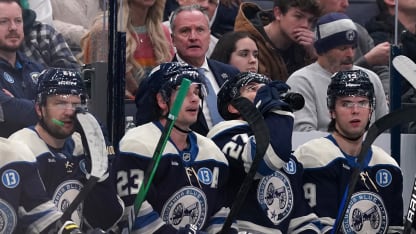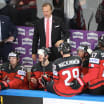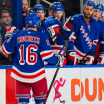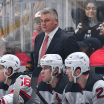COLUMBUS -- When Dean Evason took over as coach of the Columbus Blue Jackets on July 22, he talked about building a team-first mentality so the guys would play hard for each other.
He had no idea what was to come and how his philosophy would help Columbus -- first off the ice, then on it.
The Blue Jackets have become the most inspiring story in the NHL. Entering their game at the Toronto Maple Leafs on Wednesday (7:30 p.m. ET; TVAS, SN, FDSNOH), they’re 6-1-1 in their past eight games and one point behind the Boston Bruins, Montreal Canadiens and Ottawa Senators for the second wild card into the Stanley Cup Playoffs from the Eastern Conference.
Evason should be a candidate for the Jack Adams Award, which goes to the NHL coach of the year.
“I think Dean’s going to have to be in the mix regardless of what happens here because of the adversity we’ve faced,” general manager Don Waddell said.
The Blue Jackets missed the playoffs the past four seasons and finished last in the East the past two. No one was picking them to make the playoffs this season even after they signed center Sean Monahan to a five-year, $27.5 million contract ($5.5 million average annual value) as an unrestricted free agent July 1.
Evason knew he was taking on a challenge, but he expected to have Monahan playing with forward Johnny Gaudreau, his close friend and former Calgary Flames teammate. He expected to have captain Boone Jenner and defenseman Erik Gudbranson to lead a group of skilled young players.
The Blue Jackets traded forward Patrik Laine, a top goal-scorer, to the Canadiens on Aug. 19.
Then the unimaginable happened.
Gaudreau, Columbus’ leading scorer the past two seasons, and his brother, Matthew, died Aug. 29 while riding bicycles at home in Salem County, New Jersey. They were struck by a suspected drunk driver who was indicted by a grand jury in December on two counts of second-degree reckless vehicular homicide, two counts of first-degree aggravated manslaughter, fourth-degree tampering with physical evidence and second-degree leaving the scene of a fatal accident.
Everyone was devastated. Waddell and Evason asked the players, “What would Johnny want us to do?” He’d want them to play hockey and enjoy coming to the rink each day like he did.
Asked if the team-first mentality provided a foundation, Evason said, “I think in part that helped.” Then he deflected to others.
He credited Waddell’s leadership for giving the players a voice and allowing them to grieve on their terms. Waddell should be a candidate for GM of the Year himself.
“There was no timeline for anything like this,” Evason said. “It was a time where we just allowed them to be together, to heal, and a lot of guys did it different ways.”
Jenner sustained a shoulder injury in practice late in the preseason, and Gudbranson sustained one in the third game of the regular season. Neither has played since. The Blue Jackets (22-18-7) have dealt with injuries to other key players.
Waddell said Evason doesn’t worry about the guys he doesn’t have. Evason said players have stepped up into leadership roles in ways they wouldn’t have otherwise, mentioning Monahan, defenseman Zach Werenski and forwards Mathieu Olivier and Sean Kuraly. Young players have grown at the same time.
“I think that they’ve pulled together through all this, through adversity, regardless of what we tried to implement as far as team-first,” Evason said. “I think when a tragedy like that happens, you come together, you stick together, and our group has done that.”
The team-first mentality isn’t empty coachspeak. It translates tangibly to the ice.
“Not to disrespect past coaching and management,” Olivier said, “but I think that the approach that we’ve taken this year and the changes that we’ve made to our system and to our approach just in general has been really beneficial for our team.”
Evason preaches defense but wants the Blue Jackets to play fast and use their skill on offense. He likes to roll four lines, keeping everyone fresh, involved and confident.
To do that, guys must have each other’s backs.
“It’s really a team thing, right?” Olivier said. “You want to be aggressive. You want to have guys that pressure the puck everywhere on the ice. But when you play that way, the other guys that are not pressuring, you’ve got to have them in the right positions and in the right mindset for that to be successful.”
It has been a process.
The Blue Jackets started 12-15-5. As of Dec. 18, they were averaging 3.22 goals per game, 11th in the NHL, and 3.63 goals against per game, 30th in the League.
They’ve gone 10-3-2 since. Over this stretch, they’re averaging 3.33 goals per game, seventh in the NHL, and 2.73 goals against per game, tied with the St. Louis Blues for 16th in the League.
The offensive numbers are perhaps most surprising, considering the Blue Jackets averaged 2.85 goals per game with Gaudreau last season, tied with the Blues for 24th in the NHL. But the defensive improvement is also impressive from season to season and within this season. Columbus allowed 3.63 goals per game last season, 31st in the League.
“Do we allow our players to make mistakes? Yes,” Evason said. “But do we make them accountable for those mistakes? Yes. … We’ve sat some guys that maybe are a little bit [unnoticed]. People wouldn’t think we did. But we give them an opportunity to learn from their mistakes, and if they don’t, then there have to be repercussions, and there has to be accountability. We definitely allow them to play the game freely as long as they’re doing the right things on the ice and the right side of the puck.”
Werenski has established himself as a candidate for the Norris Trophy, which goes to the NHL’s best defenseman, partly because he has the freedom to jump into the play and has put up big offensive numbers. He has 15 goals, tied with Cale Makar for first among NHL defensemen, and 51 points, one behind Makar for first.
Forward Kirill Marchenko leads the Blue Jackets with 18 goals, but the big story is that he’s plus-26, tied with Washington Capitals forward Aliaksei Protas for second in the NHL behind Edmonton Oilers center Leon Draisaitl, who is plus-27. Marchenko was minus-28 over the last two seasons. Evason challenged him to play more on the inside and win more battles.
“New coach have a different system,” Marchenko said. “It’s help for everybody here, I think, because whole team, everybody grow up right now and [rise to] the next level. He give me confidence, trust, and I try to be good.”
Seven players have 10 goals or more, including Olivier, a tough guy who has doubled the NHL career high of five he set with Columbus in 2022-23 and matched last season.
Olivier, 27, is in his seventh season of pro hockey. He has played in the Calder Cup Playoffs with Milwaukee of the American Hockey League in 2018-19 and 2021-22, and in the Stanley Cup Playoffs with the Nashville Predators in 2020-21 and 2021-22. He said Evason’s system fits the team, and it’s simple and predictable. The players have bought in.
“As a pro, you learn that playoff teams and teams that have success in the postseason, it’s all about predictable hockey,” he said. “And that’s weird to say, because you’d think, ‘You have the best players in the world, right? Guys could read off each other and make plays that aren’t planned.’ But the best teams, you have the best guys that play predictable hockey, and then their skill takes over, because the other team has to respect the way you play.
“I think this year’s been a big difference for us.”


















